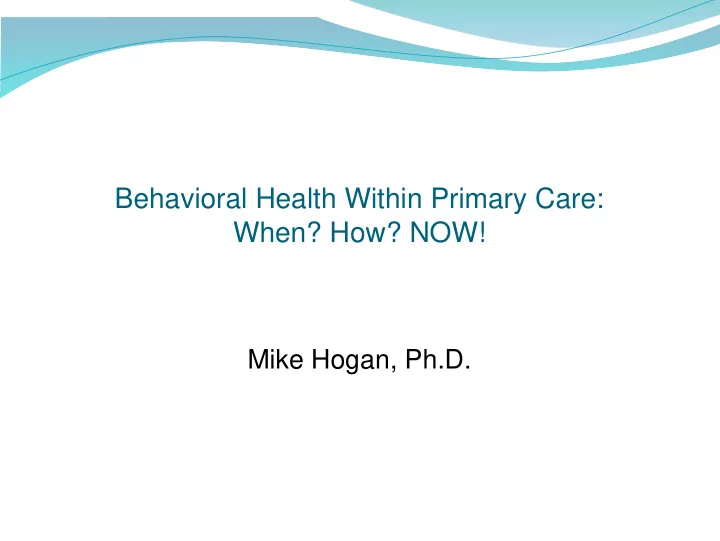

Behavioral Health Within Primary Care: When? How? NOW! Mike Hogan, Ph.D.
Behavioral Health in Primary Care: WHY? • Clinical reasons: Primary care is where people with MH/SUD conditions present • Cost reasons: “Dis - integrated Care” is expensive, ineffective. Behavioral conditions drive costs, integrated care reduces total costs • Integration is trending: PPACA plus MHEAPA will drive it--and payers love it
Why Integration: Physical and Behavioral Needs Overlap
The Pathways Underlying Comorbidity* Require an Integrated, Proactive Response * Adapted from Katon, 2003
The Roots of Most Ill-Health are Behavioral: Lessons From the Adverse Childhood Experiences (ACE) Study* • Adverse Childhood Experiences (ACEs) are very common • ACEs are strong predictors of later health risks and disease • This combination makes ACEs the leading determinant of the health and social well-being of our nation *Information available at www.acestudy.org
ACE Scores, Smoking and COPD 0 1 2 3 4 or more 20.00 ACE Score: 18.00 Percent With Problem 16.00 14.00 12.00 10.00 8.00 6.00 4.00 2.00 0.00 Smoking COPD Regular smoking by age 14
Series1 Where Integration is Important Primary Care, Health Centers and Medical Homes NCS-R: Where People Get Care MH Professional 18% General No Treatment Medical 60% 22% Wang P, et al., Twelve-Month Use of Mental Health Services in the United States, Arch Gen Psychiatry, 62, June 2005
66% of PCPs Report Poor Access to Specialty Mental Health Care for Their Patients Cunningham PJ, Health Affairs 2009;28(3)490-501
Integration Requires More than Lip Service: Without Behavioral Support in Primary Care Depression Care* Is Generally Inadequate 1/8 of depressed people in primary care receive “minimally adequate care” (Kessler). – Good treatment is effective: 75 – 80% of individuals with depression improve with integrated care in clinical trials – (In specialty care, about 50% get “adequate” care) – We have the opportunity to fix MH care in Primary care…can it be done? * Or Anxiety, ADHD, Problem Drinking Care….
Integration Requires More than Lip Service: "Simple Solutions" Are Not Enough Training Protocols e.g. Screening Available consultation Practice re-engineering: workflow, documentation/ records, billing Culture eats strategy for lunch
Primary BH ("Collaborative") Care: Key Elements Practice Support PCP supported by Informed, Active Patient Integrated Care Behavioral Health Care Manager Measurement- Caseload-focused Psychiatric Training based Consultation Stepped Care
Better Physical Function SF-12 Physical Function Component Summary Score (PCS-12) P<0.01 P<0.01 P<0.01 P=0.35 Callahan et al., JAGS 2005; 53:367-373
Implementation of Collaborative Care • Well-studied: over 40 RCT's • Most focus on depression, adults. Some evidence with children, other conditions • Large scale implementation: Kaiser, Group Health, Diamond. Project under way in NYS (collaboration between Health, Mental Health) • "Collaborative care...provide(s) a significant and substantial increase in clinical response...taking a clinical response rate of 46-48% with usual... treatment and increasing it 92%...this may well represent the Holy Grail of health care delivery..." (Calonge, Am. J. Prev. Med, 2012)
Challenges in Integrating Care • Getting started • Integrating different “cultures of care” – Pace: The 50 minute hour vs. the 7 minute visit – Focus on body vs. brain – Perspective from family practice: “Since half of our patients have behavioral concerns and since adaptation to all chronic illness requires behavioral change, we think we have to master this.” • Regulatory and reimbursement barriers – “One visit” billing limits, unavailable billing codes, coverage for "embedded" BH professionals – Split benefits – Licensure/certification/accreditation limits
Resources For Integrating Care • SAMHSA-HRSA Center for Integrated Health Solutions – www.integration.samhsa.gov/ • AHRQ’s Academy for Integrating Behavioral Health and Primary Care – www.integrationacademy.ahrq.gov/ • Colorado’s Advancing Care Together Initiative – www.advancingcaretogether.org
THANK YOU, AND GOOD LUCK INTEGRATING CARE
Recommend
More recommend